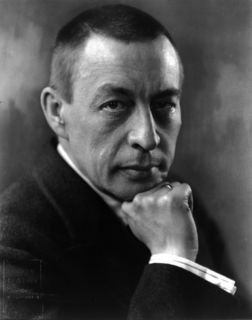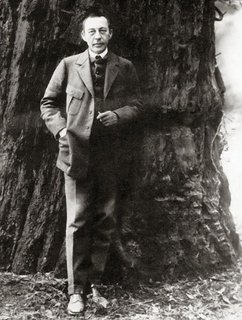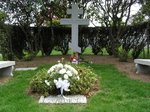13 days ago was Sergei Rachmaninoff's birthday. I didn't post last week because I was busy, and for most of this week, I have been sick. I did make an announcement though. Anyway, without any further ado, here is the article you've been waiting for:
Rachmaninoff is often regarded as one of the best pianists of the composers (up there with Franz Liszt and Frédérick Chopin). Here is a little about Rachmaninoff:

The Life of Rachmaninoff
Sergei Rachmaninoff was born on April 1st, 1873, in north-western Russia. He was from a family of Russian aristocrats and musicians. His grandfather was a musician who had studied with John Field, while his son (Rachmaninoff's father) was an army official and amateur pianist.
At the age of 4, the young boy began to study music and the piano, structured by his mother. Right away, it was apparent that he had a gift because of his ability to play passages from memory without messing up. This gained the interest of his paternal grandfather, who was a musician. By request of his grandfather, Rachmaninoff began to study with a teacher until his father gambled away their estate.

Rachmaninoff and his family would move to Saint Petersburg by the time he was ten. It was here that he would switch to studying at the Saint Petersburg Conservatory. That year, his sister would die of diphtheria, and his father would abandon them. This caused his grandparents to step in and help him to develop both spiritually, and physically.
Rachmaninoff would write his first compositions after switching to the Moscow conservatory. The young composer was influenced by love, and many of his early compositions can be traced through letters he wrote. Some of these pieces are The Youth Symphony, Prince Rostislav, and The Rock.

Rachmaninoff suffered from depression for three years after the premiere of Symphony No. 1, and composed almost nothing for this time because of the dissatisfaction he felt with the conductor as well as the performance. In this time, he got engaged to his first cousin until the orthodox church announced disapproval with the marriage. After a while, he had to take a job conducting, and compose again to make money. After receiving professional help, Rachmaninoff began to compose again. Composing his 2nd Piano concerto.
Rachmaninoff, would perform to benefit wounded soldiers when the Russian revolution broke out in 1917. When Bolshevism took over, Rachmaninoff and his family fled because they did not support it. They fled to the United States. Here, Rachmaninoff would begin to perform to earn a living, as composing could not sustain itself. He played 40 performances in 4 months, got a piano from Steinway as a gift, and signed a recording contract with Victor Talking Machine Company.

Sadly, Rachmaninoff died of melanoma on March 28th, 1943. Between his arrival in the United States and his death, Rachmaninoff would only compose 6 compositions.
10 Compositions
Here are 10 of Rachmaninoff's compositions: (Thanks to my theory teacher for helping me to pick these out)
10. Prelude in C# Minor
This sounds like a death march (likely the minor key). It sounds similar to the style that Beethoven sometimes used, as well as the style that Chopin used in his famous funeral march. The later part sounds similar to the third movement of Beethoven's Moonlight Sonata.
9. Paganinni Rhapsody
This piece is basically like a modern day mix tape (I guess). Rachmaninoff took themes by Niccolò Paganinni and wrote his own piece using them. I enjoy how the piece grows in complexity from the rather simplistic themes at the beginning, and gradually becomes harder and more thrilling to listen to. This piece also has a similar style to the style that Beethoven often used.
8. Symphonic Dances
This piece from the beginning sounds like it could be the soundtrack for an Indiana Jones movie. It is light and playful at times, and bold and adventurous at others. This piece has a quality of stability, I have not heard in any of the pieces before. Rachmaninoff develops his theme right away, and leads the audience into the story.
7. Piano Concerto no. 3
This piece is stunning. In the beginning, it sounds mysterious. Then, it begins to grow and develop in complexity, as well as tenderness. Well into the piece, the piano part is complex, and it sounds like a romantic piece you might play on a first date. All of the Piano concertos are beautiful, which is why I've decided to list all of them.
6. Cello Sonata in G minor
I never realized how cool a cello can sound. Both parts fit really well together, creating a rather beautiful sound. I enjoy the mysteriousness behind Rachmaninoff's music. I have noticed that he almost tells a story through music, and waits until the middle to hint at the climax.
5. Piano Concerto no.1
This definitely sounds like a Russian piece. The beginning is similar to the beginning of Tchaikovsky's 1st Piano Concerto, with the brass entrance/piano solos. This is the first time I've listened to this piece, and it sounds pretty cool. Especially when the piano breaks out into complex scales and arpeggios.
4. Prelude no.5 in G Minor
This sounds very much like a Russian dance. Strong at points, and beautiful at others. This prelude sounds a lot more developed than the first prelude on this list. It reminds me of Brahms' Hungarian Dance no.5 in G Minor (Perhaps it's because they're in the same key).
3. Piano Concerto no.2
I used this piece before on my list of 7 Piano Concertos You Should Listen to this week. As I wrote there, the beginning of this piece is really cool because of the way Rachmaninoff starts off with just piano chords, and grows into majestic arpeggios with a string background. I think my analogies on that list were accurate, and recommend reading them as you listen to each of the movements.
2. Symphonic Poem: Isle of the Dead
This piece reminds me of every single Scooby Doo movie I've seen. You know, the parts where they are looking for clues in the creepy old house, and you don't know when the bad guy's gonna jump out. This could literally be the soundtrack for a thriller, the music thrills by itself. Because of how mysterious it sounds, it is unknown what is going to happen when (to me at least). The chromatic scales are creepy too.
1. Symphony no.2 in E Minor
This piece is the piece I linked to in my announcement. It is probably one of my absolute favorites for the list. This, and the Isle of the Dead would make a fantastic movie soundtrack. They are both mysterious, but this one is a little bit more triumphant (Especially as the piece develops from its beginning). I can imagine that Rachmaninoff tried to tell stories through his music. Many of the pieces on this list, sound like a story (Symphonic Dances, Isle of the Dead, etc. . .) Here is the piece:
Sources
Information
Images
Previous Composer Birthdays (In order by how recent it was)
1/27 - Wolfgang (Amadeus) Mozart
The Next Birthdays will be Johannes Brahms and Pyotr Ilyich Tchaikovsky on May 7th.
Thanks for reading this! Rachmaninoff has obviously left an impact on piano music, as well as classical. His story involved fleeing to America, from his own country that was fighting amongst itself, and inspiring many through recordings and performances. Classical music definitely owes some credit to him. As always, feedback is appreciated, and see you next time!

Also remember to check for: My weekly 7 post, As Well As My Composer Birthday Posts










